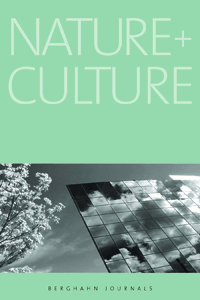
We are delighted to inform you that we will be present at the Association of American Geographers’ Annual Meeting in San Francisco, CA, March 29-April 2, 2016. Please stop by our booth #215 to browse the latest selection of books at discounted prices & pick up some free journal samples.
If you are unable to attend, we would like to provide you with a special discount offer. For the next 30 days, receive a 25% discount on all Geography and Environmental Studies titles found on our website. At checkout use discount code AAG16. Browse our newly released Geography and Environmental Studies 2016/2017 Catalog or visit our website, now with new enhanced subject searching features for a complete listing of all published and forthcoming titles.
______________________________________________________________________
Here is a preview of some of our newest releases on display:
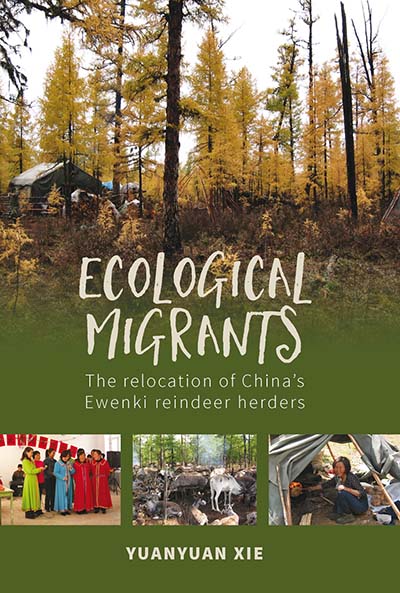 ECOLOGICAL MIGRANTS
ECOLOGICAL MIGRANTS
The Relocation of China’s Ewenki Reindeer Herders
Yuanyuan Xie
Foreword by Ping Hao
Reindeer-herding Ewenki hunters have lived in the forests of China’s Greater Khingan Range for over three hundred years. They have sustained their livelihoods by collecting plants and herbs, hunting animals and herding reindeer. This ethnography details changing Ewenki ways of life brought first by China’s modernization and development policies and more recently by ecological policies that aim to preserve and restore the badly damaged ecologies of western China. Xie reflects on modernization and urbanization in China through this study of ecological migration policies and their effects on relocated Aoluguya Ewenki hunters.
Read Introduction
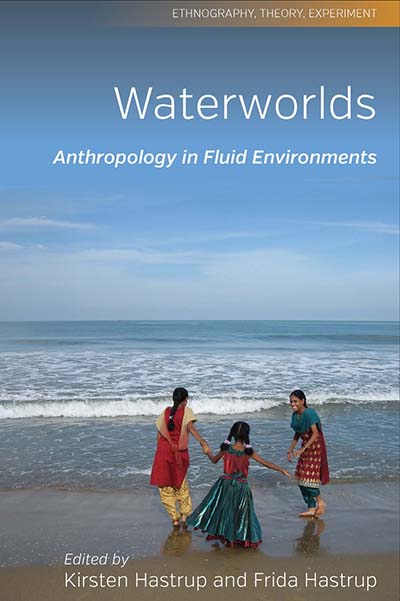 WATERWORLDS
WATERWORLDS
Anthropology in Fluid Environments
Edited by Kirsten Hastrup and Frida Hastrup
Volume 3, Ethnography, Theory, Experiment
In one form or another, water participates in the making and unmaking of people’s lives, practices, and stories. Contributors’ detailed ethnographic work analyzes the union and mutual shaping of water and social lives. This volume discusses current ecological disturbances and engages in a world where unbounded relationalities and unsettled frames of orientation mark the lives of all, anthropologists included. Water emerges as a fluid object in more senses than one, challenging anthropologists to foreground the mutable character of their objects of study and to responsibly engage with the generative role of cultural analysis.
Read Introduction: Waterworlds at Large
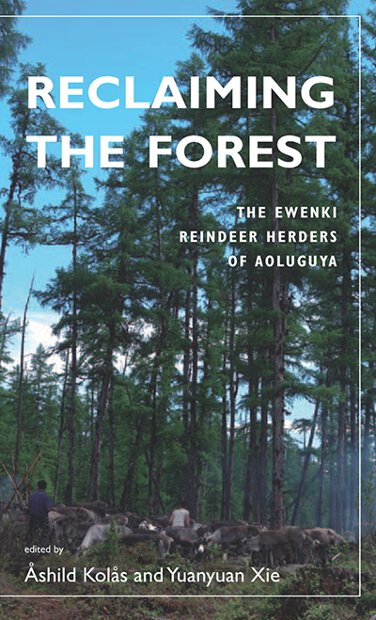 RECLAIMING THE FOREST
RECLAIMING THE FOREST
The Ewenki Reindeer Herders of Aoluguya
Edited by Åshild Kolås and Yuanyuan Xie
Foreword by F. Georg Heyne
The reindeer herders of Aoluguya, China, are a group of former hunters who today see themselves as “keepers of reindeer” as they engage in ethnic tourism and exchange experiences with their Ewenki neighbors in Russian Siberia. Though to some their future seems problematic, this book focuses on the present, challenging the pessimistic outlook, reviewing current issues, and describing the efforts of the Ewenki to reclaim their forest lifestyle and develop new forest livelihoods. Both academic and literary contributions balance the volume written by authors who are either indigenous to the region or have carried out fieldwork among the Aoluguya Ewenki since the late 1990s.
Read Introduction: Writing the ‘Reindeer Ewenki’
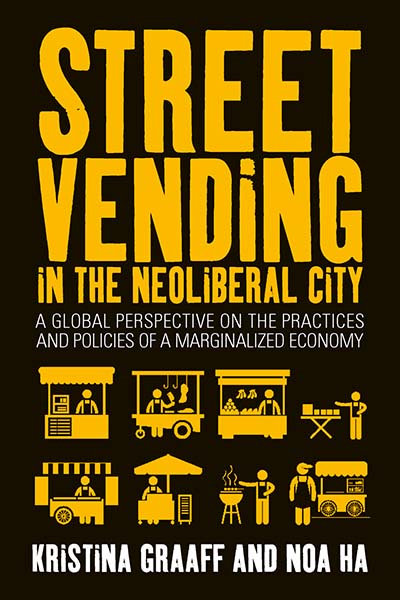 STREET VENDING IN THE NEOLIBERAL CITY
STREET VENDING IN THE NEOLIBERAL CITY
A Global Perspective on the Practices and Policies of a Marginalized Economy
Edited by Kristina Graaff and Noa Ha
Examining street vending as a global, urban, and informalized practice found both in the Global North and Global South, this volume presents contributions from international scholars working in cities as diverse as Berlin, Dhaka, New York City, Los Angeles, Calcutta, Rio de Janeiro, and Mexico City. The aim of this global approach is to repudiate the assumption that street vending is usually carried out in the Southern hemisphere and to reveal how it also represents an essential—and constantly growing—economic practice in urban centers of the Global North. Although street vending activities vary due to local specificities, this anthology illustrates how these urban practices can also reveal global ties and developments.
Read Introduction: Street Vending in the (Neoliberal) City: A Global Perspective on the Practices and Policies of a Marginalized Economy
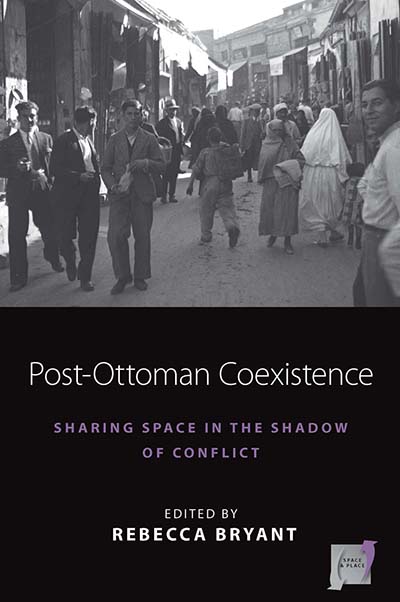 POST-OTTOMAN COEXISTENCE
POST-OTTOMAN COEXISTENCE
Sharing Space in the Shadow of Conflict
Edited by Rebecca Bryant
Volume 16, Space and Place
In Southeast Europe, the Balkans, and Middle East, scholars often refer to the “peaceful coexistence” of various religious and ethnic groups under the Ottoman Empire before ethnonationalist conflicts dissolved that shared space and created legacies of division. Post-Ottoman Coexistence interrogates ways of living together and asks what practices enabled centuries of cooperation and sharing, as well as how and when such sharing was disrupted. Contributors discuss both historical and contemporary practices of coexistence within the context of ethno-national conflict and its aftermath.
Read Introduction: Everyday Coexistence in the Post-Ottoman Space
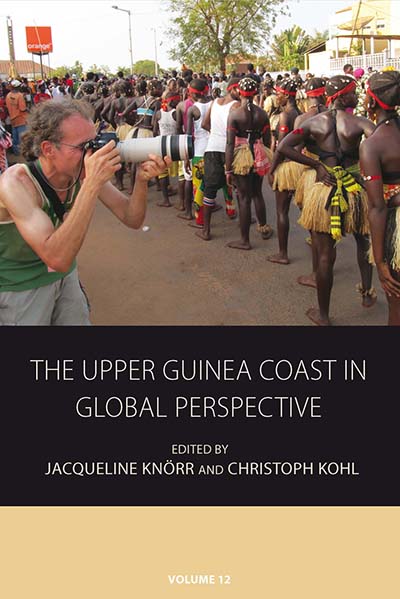 THE UPPER GUINEA COAST IN GLOBAL PERSPECTIVE
THE UPPER GUINEA COAST IN GLOBAL PERSPECTIVE
Edited by Jacqueline Knörr and Christoph Kohl
Volume 12, Integration and Conflict Studies
For centuries, Africa’s Upper Guinea Coast region has been the site of regional and global interactions, with societies from different parts of the African continent and beyond engaging in economic trade, cultural exchange, and various forms of conflict. This book provides a wide-ranging look at how such encounters have continued into the present day, identifying the disruptions and continuities in religion, language, economics, and various other social phenomena that have resulted. These accounts show a region that, while still grappling with the legacies of colonialism and the slave trade, is both shaped by and an important actor within ever-denser global networks, exhibiting consistent transformation and creative adaptation.
Read Introduction: The Upper Guinea Coast in Global Perspective
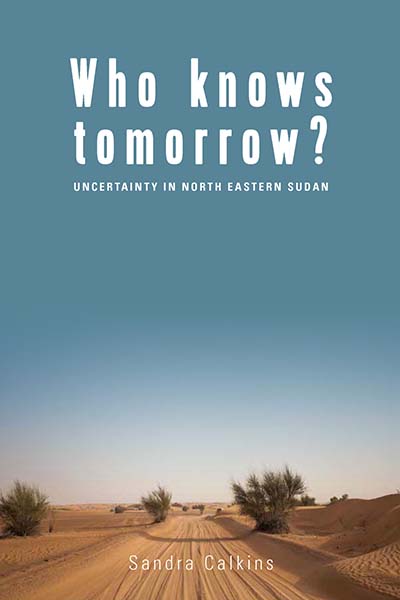 WHO KNOWS TOMORROW?
WHO KNOWS TOMORROW?
Uncertainty in North-Eastern Sudan
Sandra Calkins
Although uncertainty is intertwined with all human activity, plans, and aspirations, it is experienced differently: at times it is obsessed over and at times it is ignored. This ethnography shows how Rashaida in north-eastern Sudan deal with unknowns from day-to-day unpredictability to life-threatening dangers. It argues that the amplification of uncertainty in some cases and its extenuation in others can be better understood by focusing on forms that can either hold the world together or invite doubt. Uncertainty, then, need not be seen solely as a debilitating problem, but also as an opportunity to create other futures.
Read Introduction: Taming Unknowns in Sudan
__________________________________________________
Environment in History: International Perspectives Series
Published in association with the European Society for Environmental History (ESEH), and the Rachel Carson Center (RCC)
The relationship between human society and the natural world is being studied with increased urgency and interest. Investigating this relationship from historical, cultural, and political perspectives, the monographs and collected volumes in this series showcase high-quality research in environmental history and cognate disciplines in the social and natural sciences. The series strives to bridge both national and disciplinary divides, with a particular emphasis on European, transnational, and comparative research.
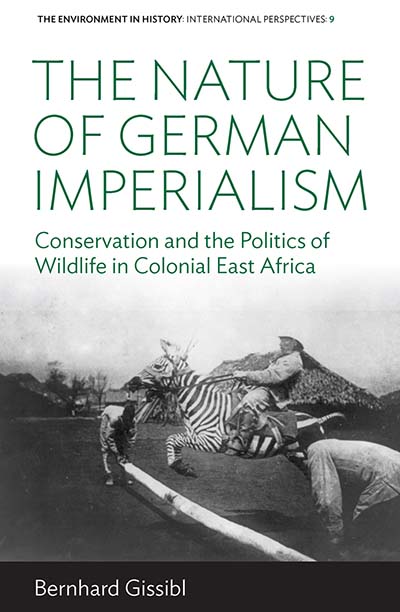 Volume 9, Forthcoming
Volume 9, Forthcoming
THE NATURE OF GERMAN IMPERIALISM
Conservation and the Politics of Wildlife in Colonial East Africa
Bernhard Gissibl
Today, the East African state of Tanzania is renowned for wildlife preserves such as the Serengeti National Park, the Ngorongoro Conservation Area, and the Selous Game Reserve. Yet few know that most of these initiatives emerged from decades of German colonial rule. This book gives the first full account of Tanzanian wildlife conservation up until World War I, focusing upon elephant hunting and the ivory trade as vital factors in a shift from exploitation to preservation that increasingly excluded indigenous Africans. Analyzing the formative interactions between colonial governance and the natural world, The Nature of German Imperialism situates East African wildlife policies within the global emergence of conservationist sensibilities around 1900.
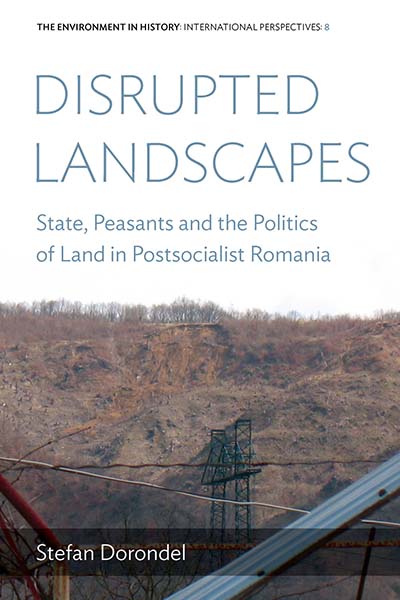 Volume 8
Volume 8
DISRUPTED LANDSCAPES
State, Peasants and the Politics of Land in Postsocialist Romania
Stefan Dorondel
The fall of the Soviet Union was a transformative event for the national political economies of Eastern Europe, leading not only to new regimes of ownership and development but to dramatic changes in the natural world itself. This painstakingly researched volume focuses on the emblematic case of postsocialist Romania, in which the transition from collectivization to privatization profoundly reshaped the nation’s forests, farmlands, and rivers. From bureaucrats abetting illegal deforestation to peasants opposing government agricultural policies, it reveals the social and political mechanisms by which neoliberalism was introduced into the Romanian landscape.
Read Introduction: Privatizing the State and the Transformation of the Agrarian Landscape
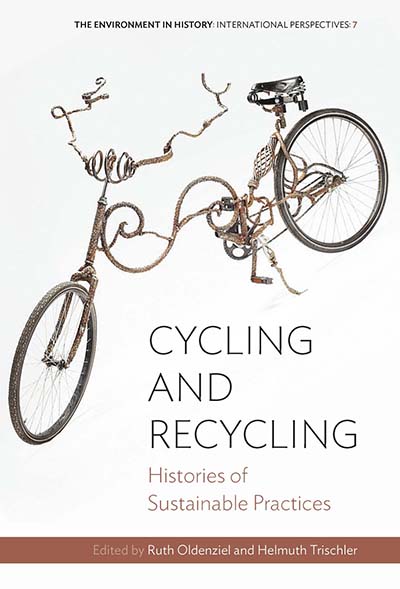 Volume 7
Volume 7
CYCLING AND RECYCLING
Histories of Sustainable Practices
Edited by Ruth Oldenziel and Helmuth Trischler
Technology has long been an essential consideration in public discussions of the environment, with the focus overwhelmingly on creating new tools and techniques. In more recent years, however, activists, researchers, and policymakers have increasingly turned to mobilizing older technologies in their pursuit of sustainability. In fascinating case studies ranging from the Early Modern secondhand trade to utopian visions of human-powered vehicles, the contributions gathered here explore the historical fortunes of two such technologies—bicycling and waste recycling—tracing their development over time and providing valuable context for the policy successes and failures of today.
Read Introduction: How Old Technologies Became Sustainable: An Introduction
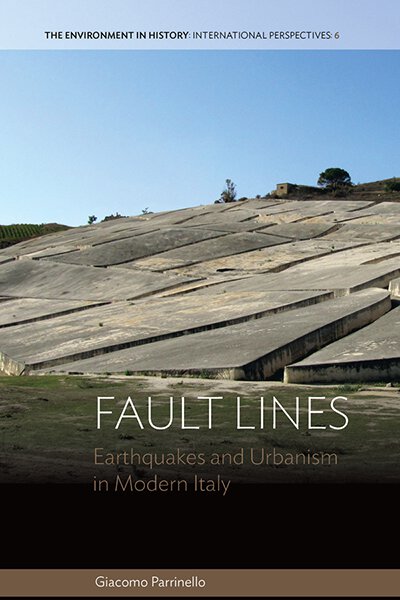 Volume 6
Volume 6
FAULT LINES
Earthquakes and Urbanism in Modern Italy
Giacomo Parrinello
Earth’s fractured geology is visible in its fault lines. It is along these lines that earthquakes occur, sometimes with disastrous effects. These disturbances can significantly influence urban development, as seen in the aftermath of two earthquakes in Messina, Italy, in 1908 and in the Belice Valley, Sicily, in 1968. Following the history of these places before and after their destruction, this book explores plans and developments that preceded the disasters and the urbanism that emerged from the ruins. These stories explore fault lines between “rural” and “urban,” “backwardness” and “development,” and “before” and “after,” shedding light on the role of environmental forces in the history of human habitats.
Read Introduction: Can Earthquakes Speak?
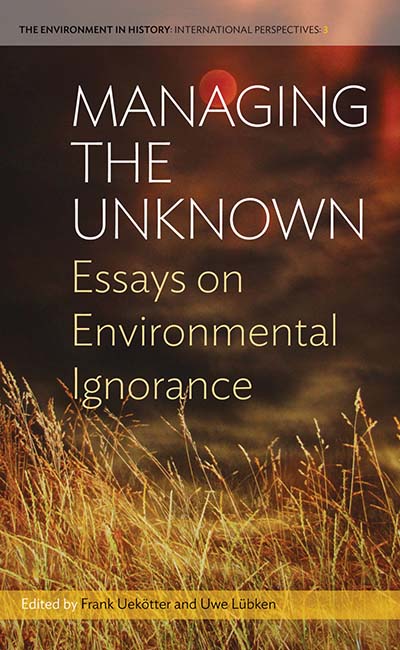 Volume 3, New in Paperback
Volume 3, New in Paperback
MANAGING THE UNKNOWN
Essays on Environmental Ignorance
Edited by Frank Uekötter and Uwe Lübken
Information is crucial when it comes to the management of resources. But what if knowledge is incomplete, or biased, or otherwise deficient? How did people define patterns of proper use in the absence of cognitive certainty? Discussing this challenge for a diverse set of resources from fish to rubber, these essays show that deficient knowledge is a far more pervasive challenge in resource history than conventional readings suggest. Furthermore, environmental ignorance does not inevitably shrink with the march of scientific progress: these essays suggest more of a dialectical relationship between knowledge and ignorance that has different shapes and trajectories. With its combination of empirical case studies and theoretical reflection, the essays make a significant contribution to the interdisciplinary debate on the production and resilience of ignorance. At the same time, this volume combines insights from different continents as well as the seas in between and thus sketches outlines of an emerging global resource history.
Read Introduction: The Social Functions of Ignorance
 Volume 2, New in Paperback
Volume 2, New in Paperback
POWERLESS SCIENCE?
Science and Politics in a Toxic World
Edited by Soraya Boudia and Nathalie Jas
In spite of decades of research on toxicants, along with the growing role of scientific expertise in public policy and the unprecedented rise in the number of national and international institutions dealing with environmental health issues, problems surrounding contaminants and their effects on health have never appeared so important, sometimes to the point of appearing insurmountable. This calls for a reconsideration of the roles of scientific knowledge and expertise in the definition and management of toxic issues, which this book seeks to do. It looks at complex historical, social, and political dynamics, made up of public controversies, environmental and health crises, economic interests, and political responses, and demonstrates how and to what extent scientific knowledge about toxicants has been caught between scientific, economic, and political imperatives.
Read Introduction: Greatness and Misery of Science in a Toxic World
__________________________________________________
New in Paperback:
 BORDER ENCOUNTERS
BORDER ENCOUNTERS
Asymmetry and Proximity at Europe’s Frontiers
Edited by Jutta Lauth Bacas and William Kavanagh†
“…provides a rich and thought provoking perspective on encounters and connectivity at the borders of Europe – both internal and external.” · The Journal of Cross Border Studies in Ireland
Among the tremendous changes affecting Europe in recent decades, those concerning political frontiers have been some of the most significant. International borders are being opened in some regions while being redefined or reinforced in others. The social relationships of those living in these borderland regions are also changing fundamentally. This volume investigates, from a local, ground-up perspective, what is happening at some of these border encounters: face-to-face interactions and relations of compliance and confrontation, where people are bargaining, exchanging goods and information, and maneuvering beyond state boundaries. Anthropological case studies from a number of European borderlands shed light on the questions of how, and to what extent, the border context influences the changing interactions and social relationships between people at a political frontier.
Read Introduction: Border Encounters – Asymmetry and Proximity at Europe’s Frontiers
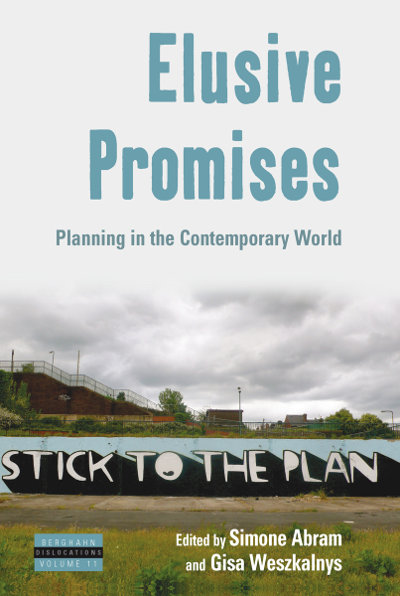 ELUSIVE PROMISES
ELUSIVE PROMISES
Planning in the Contemporary World
Edited by Simone Abram and Gisa Weszkalnys
Volume 11, Dislocations
Planning in contemporary democratic states is often understood as a range of activities, from housing to urban design, regional development to economic planning. This volume sees planning differently—as the negotiation of possibilities that time offers space. It explores what kind of promise planning offers, how such a promise is made, and what happens to it through time. The authors, all leading anthropologists, examine the time and space, creativity and agency, authority and responsibility, and conflicting desires that plans attempt to control. They show how the many people involved with planning deal with the discrepancies between what is promised and what is done. The comparative essays offer insight into the expected and unexpected outcomes of planning (from visionary utopias to bureaucratic dystopia or something in-between), how the future is envisioned at the outset, and what actual work is done and how it affects people’s lives.
Read Chapter 1. Elusive promises: Planning in the Contemporary World An Introduction
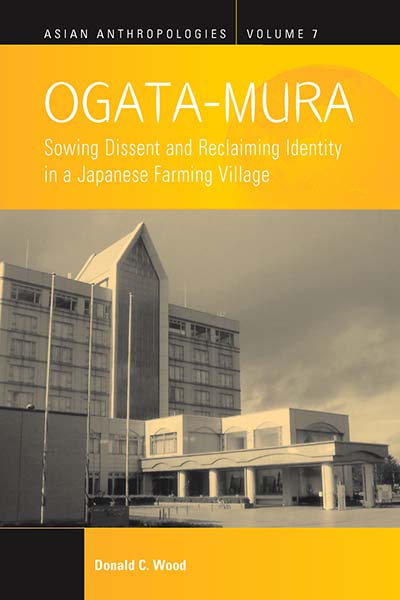 OGATA-MURA
OGATA-MURA
Sowing Dissent and Reclaiming Identity in a Japanese Farming Village
Donald C. Wood
Volume 7, Asian Anthropologies
“In his densely detailed, long-term study of Ogata-mura, Wood has taken us a lifetime away from the first studies of Japanese villages carried out by foreigners in the 1930s and 1950s… Wood presents an excellent analysis of the conflict between the view held by some residents that farming is a way of life and the conviction by others that it is a business like any other. The authorities have proved remarkably tone-deaf to the implications of this contrast, not only in Ogata-mura, but on the national level as well. Wood is able to provide a degree of detail that most ethnographers would envy.” · Asian Anthropology
Based on seventeen years of research, this book explores the process of Ogatamura’s development from the planning stages to the present. An intensive ethnographic study of the relationship between land reclamation, agriculture, and politics in regional Japan, it traces the internal social effects of the village’s economic transformations while addressing the implications of national policy at the municipal and regional levels.
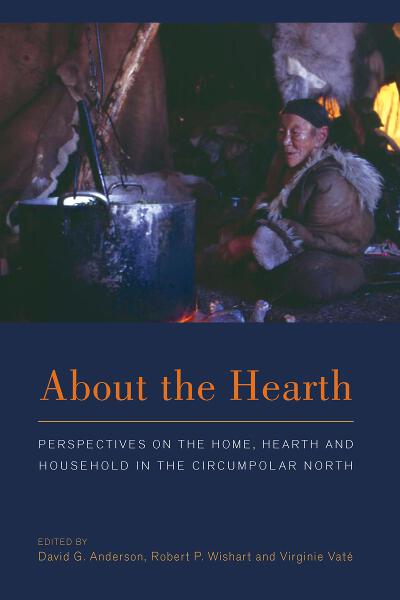 ABOUT THE HEARTH
ABOUT THE HEARTH
Perspectives on the Home, Hearth and Household in the Circumpolar North
Edited by David G. Anderson, Robert P. Wishart, and Virginie Vaté
“Each chapter offers something interesting for the reader…One can list bright and sometimes provocative ideas put forth by each contributor…The main advantage of this book is the ability to spark interest among the most diverse groups of specialists in the field of indigenous cultures.” · Social Anthropology/Anthropologie sociale
Based on years of in-depth research, this book presents and analyzes how the people of the circumpolar regions conceive, build, memorialize, and live in their dwellings. This book seeks to set a new standard for interdisciplinary work within the humanities and social sciences and includes anthropological work on vernacular architecture, environmental anthropology, household archaeology and demographics.
__________________________________________________
Berghahn Journals:
 Environment and Society
Environment and Society
Advances in Research
Environment and Society publishes critical reviews of the latest research literature on environmental studies, including subjects of theoretical, methodological, substantive, and applied significance. Articles also survey the literature regionally and thematically and reflect the work of anthropologists, geographers, environmental scientists, and human ecologists from all parts of the world in order to internationalize the conversations within environmental anthropology, environmental geography, and other environmentally oriented social sciences. The publication will appeal to academic, research, and policy-making audiences alike.
See Also: EnviroSociety, a multimedia site that provides insights into contemporary socio-ecological issues with posts from top scholars in the social sciences that engage readers interested in current environmental topics.
 Focaal
Focaal
Journal of Global and Historical Anthropology
Focaal – Journal of Global and Historical Anthropology is a peer-reviewed journal advocating an approach that rests in the simultaneity of ethnography, processual analysis, local insights, and global vision. It is at the heart of debates on the ongoing conjunction of anthropology and history as well as the incorporation of local research settings in the wider spatial networks of coercion, imagination, and exchange that are often glossed as “globalization” or “empire.”
See Also: Focaalblog, a blog that aims to accelerate and intensify anthropological conversations beyond what a regular academic journal can do, and to make them more widely, globally, and swiftly available.
Nature and Culture is now indexed in Current Contents/Social and Behavioral Sciences (CC/S&BS) and the Social Sciences Citation Index (SSCI)!
Nature and Culture (NC) is a forum for the international community of scholars and practitioners to present, discuss, and evaluate critical issues and themes related to the historical and contemporary relationships that societies, civilizations, empires, regions, nation-states have with Nature. The journal contains a serious interpolation of theory, methodology, criticism, and concrete observation forming the basis of this discussion.
The mission of the journal is to move beyond specialized disciplinary enclaves and mind-sets toward broader syntheses that encompass time, space and structures in understanding the Nature-Culture relationship. The Journal furthermore provides an outlet for the identification of knowledge gaps in our understanding of this relationship.
 Regions and Cohesion
Regions and Cohesion
Regiones y Cohesión / Régions et Cohésion
Regions and Cohesion is a needed platform for academics and practitioners alike to disseminate both empirical research and normative analysis of topics related to human and environmental security, social cohesion, and governance. It covers themes, such as the management of strategic resources, environment and society, social risk and marginalization, disasters and policy responses, violence, war and urban security, the quality of democracy, development, public health, immigration, human rights, organized crime, and cross-border human security.
Interdisciplinary in nature and multi-lingual in character (English, French, Spanish), the journal promotes the comparative examination of the human and environmental impacts of various aspects of regional integration across geographic areas, time periods, and policy arenas.
 Transfers
Transfers
Interdisciplinary Journal of Mobility Studies
Transfers: Interdisciplinary Journal of Mobility Studies is a peer-reviewed journal publishing cutting-edge research on the processes, structures and consequences of the movement of people, resources, and commodities. Intellectually rigorous, broadly ranging, and conceptually innovative, the journal combines the empiricism of traditional mobility history with more recent methodological approaches from the social sciences and the humanities.
The journal’s scholarly essays, book and exhibit reviews, artwork and photography, as well as special features provide a rich variety of perspectives that include: analyses of the past and present experiences of vehicle drivers, passengers, pedestrians, migrants, and refugees; accounts of the arrival and transformation of mobility in different nations and locales; and investigations of the kinetic processes of global capital, technology, chemical and biological substances, images, narratives, sounds, and ideas.

